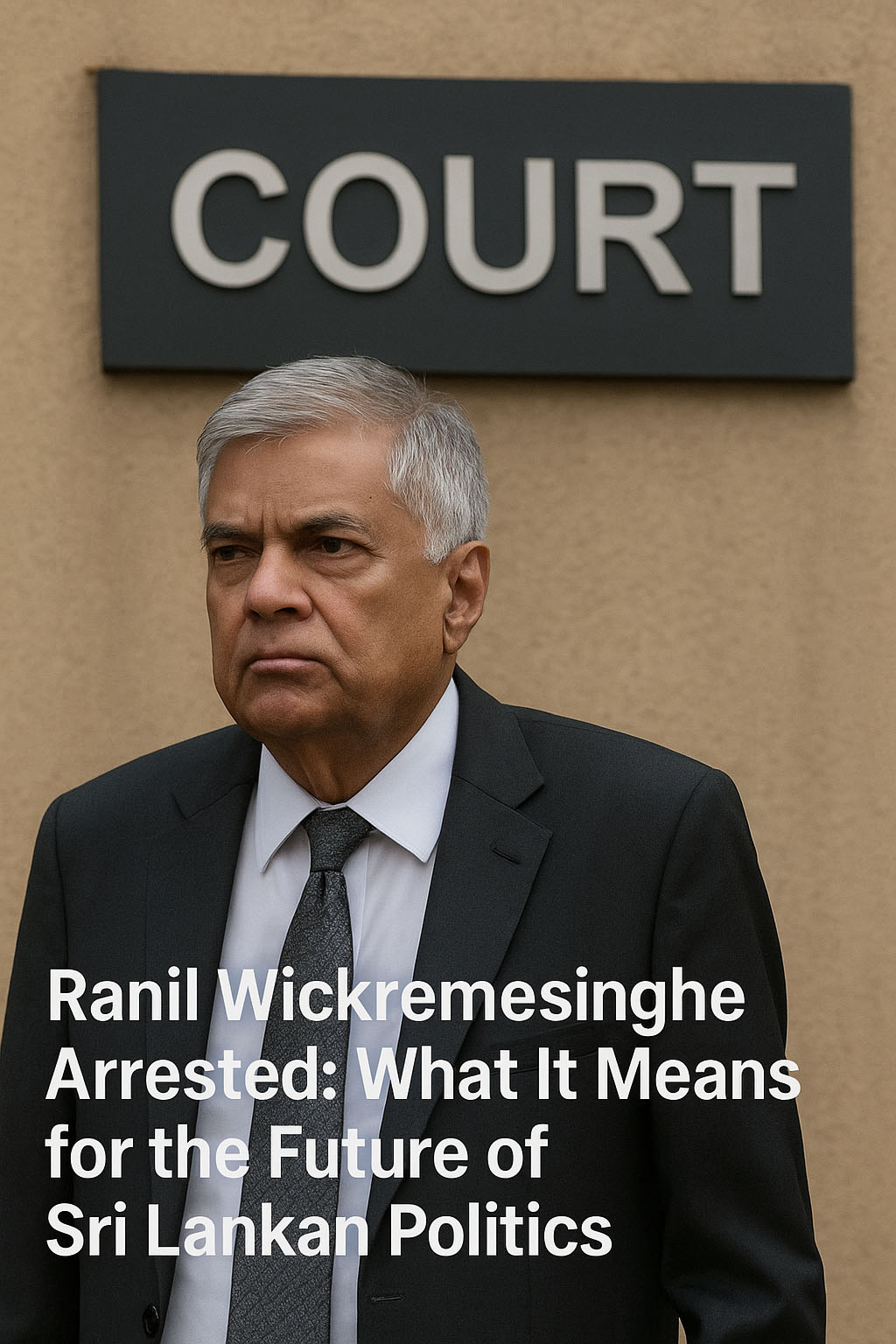Ranil Wickremesinghe Arrested: What It Means for the Future of Sri Lankan Politics
Sri Lanka has entered a new chapter in its turbulent political history. In early 2025, Ranil Wickremesinghe, the former President and one of the country’s most seasoned politicians, was arrested by the Financial Crimes Investigations Department (FCID) on charges of misusing state funds. His arrest has not only shocked the nation but also raised fundamental questions about corruption, accountability, and the direction of Sri Lanka’s fragile democracy.
For decades, Wickremesinghe was seen as a central figure in Sri Lanka’s political landscape. But his downfall highlights a wider struggle—how the country can rebuild trust between leaders and citizens after years of economic hardship and political unrest.
In a dramatic and unprecedented development, Sri Lanka’s former President Ranil Wickremesinghe has been arrested over allegations of misusing state funds during his tenure. The news has sent shockwaves across the nation, as Wickremesinghe is not only one of Sri Lanka’s longest-serving political leaders but also a figure who played a critical role during the country’s economic crisis in 2022. His arrest represents a watershed moment in Sri Lankan politics, raising tough questions about accountability, corruption, and the influence of political power.
This case has gripped the attention of citizens, international observers, and political analysts alike. While some see it as a long-awaited step towards greater transparency and justice, others believe it could be politically motivated, aimed at sidelining him from future political influence. Beyond the personal fate of Wickremesinghe, the event is being viewed as a test of Sri Lanka’s judicial system and a potential turning point in its struggle to restore public trust in governance.
Why Was Ranil Wickremesinghe Arrested?
The FCID’s investigation revealed that Wickremesinghe allegedly misused Rs. 16.9 million (around USD 50,000) during his tenure as President in 2022. The money was reportedly used to extend an official trip to London, where he attended his wife’s university convocation, after visiting the United States and Cuba on official duties.
Authorities claim this was a clear misuse of taxpayer money, violating financial regulations. His supporters, however, insist that this case is politically motivated, aimed at destroying his legacy and eliminating him as a political rival.
Regardless of which side is right, the arrest has put Wickremesinghe’s long political career under scrutiny.
Ranil Wickremesinghe’s Political Journey
Wickremesinghe is no stranger to Sri Lankan politics. A lawyer by training, he entered politics in the late 1970s and rose through the ranks of the United National Party (UNP). Over the years, he became one of the most influential leaders in the country, serving as Prime Minister six times—more than any other politician in Sri Lankan history.
In 2022, when Sri Lanka was battling its worst economic crisis since independence, Wickremesinghe was sworn in as President following Gotabaya Rajapaksa’s resignation. At that time, Sri Lanka faced:
- Severe fuel shortages
- Daily power cuts
- Scarcity of food and medicines
- Skyrocketing inflation
Although controversial, Wickremesinghe was credited with negotiating a $2.9 billion IMF bailout, which helped stabilize the collapsing economy. Yet, his policies—including tax hikes and austerity measures—were deeply unpopular with ordinary citizens.
His tenure as President was short-lived. In the 2024 Presidential Elections, Ranil Wickremesinghe finished third, losing to opposition-backed candidates. Many thought his political journey had ended there—but his arrest in 2025 has reignited his role in national discourse, albeit in a very different way.
Ranil Wickremesinghe’s Political Career: A Long and Controversial Journey
Ranil Wickremesinghe’s political career spans over four decades, making him one of the most experienced and enduring figures in Sri Lankan politics. A lawyer by profession, he entered politics in the late 1970s through the United National Party (UNP), quickly establishing himself as a leader with sharp intellect and administrative skills.
Over the years, Wickremesinghe went on to serve as Prime Minister six times, a record in Sri Lankan history. His leadership style was often described as technocratic and policy-driven, favoring negotiations and institutional reforms over populist politics. While this approach earned him respect from certain circles, it also left him disconnected from grassroots-level voters, contributing to his repeated electoral defeats.
One of the defining moments in his career came in 2001, when he became Prime Minister and attempted to bring peace during Sri Lanka’s decades-long civil war with the LTTE (Liberation Tigers of Tamil Eelam). He signed a Ceasefire Agreement in 2002, brokered by Norway, which briefly brought hope for peace. However, the deal collapsed within a few years, and critics accused him of being too lenient towards the LTTE, damaging his popularity among nationalist groups.
Despite setbacks, Wickremesinghe remained a dominant figure in opposition politics. His reputation as a pro-Western, pro-business leader earned him international recognition, particularly in economic and diplomatic circles. However, at home, his failure to secure strong election victories kept him in a cycle of short-lived terms in power.
In 2022, when Sri Lanka was hit by its worst-ever economic crisis, Wickremesinghe made an unexpected return. With mass protests forcing then-President Gotabaya Rajapaksa to resign, Parliament elected Wickremesinghe as the new President. His experience and international credibility were seen as assets to negotiate urgently needed financial assistance.
During his presidency, Wickremesinghe managed to secure a $2.9 billion bailout from the International Monetary Fund (IMF), a lifeline for the collapsing economy. He implemented difficult reforms, including tax increases, subsidy cuts, and structural adjustments, which stabilized the financial system but were deeply unpopular among ordinary citizens. Many Sri Lankans accused him of protecting the interests of elites while placing the burden of recovery on the public.
By the time of the 2024 Presidential Elections, Wickremesinghe’s popularity had diminished. He finished third, marking a political downfall for a leader who once held the highest office. Yet, his influence within Sri Lankan politics, shaped by decades of leadership, negotiation, and controversy, meant that his name still carried weight—even as allegations of corruption began to tarnish his legacy
Allegations of Corruption and Misuse of Funds
The case against Ranil Wickremesinghe revolves around financial accountability. Investigators allege that state funds were diverted for personal purposes during an international trip, a serious offense under Sri Lankan law.
This arrest is significant because:
- First Time in History – Ranil Wickremesinghe is the first former Sri Lankan President to be arrested for financial misconduct.
- Test of Law Enforcement – The case will test whether Sri Lanka’s institutions can act independently without political influence.
- Symbolic for Anti-Corruption Efforts – After decades of allegations against leaders, this case may mark a turning point for governance and accountability.
Public and Political Reaction
The arrest has deeply divided Sri Lankan society:
- Public Outrage: Many citizens see this as overdue justice, pointing to decades of unchecked corruption by political elites.
- Supporters’ Defense: Wickremesinghe’s loyalists argue that the arrest is a politically motivated attempt by rivals to silence him.
- Opposition Leaders: Rival parties have welcomed the arrest, calling it a “victory for the people” and proof that corruption cannot be tolerated.
- Global Interest: International observers, including human rights organizations, are closely monitoring the case as Sri Lanka attempts to rebuild its democratic image.
Impact on the United National Party (UNP)
Ranil Wickremesinghe’s arrest is a major blow to the UNP, a party already struggling to remain relevant after recent electoral defeats. Without Wickremesinghe’s leadership, the party may face an identity crisis.
Younger politicians in the UNP could see this as an opportunity to step forward, but the scandal may overshadow their efforts. If the case drags on, it could even spell the end of the UNP as a significant political force.
Lessons from the Economic Crisis
Wickremesinghe’s arrest also ties back to the 2022 economic collapse, which exposed how decades of corruption, mismanagement, and poor governance had weakened the nation.
The IMF bailout temporarily stabilized the economy, but ordinary Sri Lankans still face:
- High cost of living
- Unemployment
- Weak public trust in institutions
The arrest highlights the need for systemic reforms in governance, not just the punishment of one individual.
Future of Sri Lankan Politics
The road ahead is uncertain. Several scenarios could unfold:
- Conviction: If Wickremesinghe is found guilty, it would be a watershed moment, proving that even the highest offices are not above the law.
- Acquittal: If cleared, Wickremesinghe may attempt a political comeback, possibly regaining public sympathy.
- Extended Trial: Like many South Asian legal cases, this trial could drag on for years, keeping the political climate unstable.
Either way, the outcome will shape Sri Lanka’s democratic future and the way citizens view their leaders.
International Implications
Sri Lanka’s political instability has global consequences. The country sits strategically in the Indian Ocean, and its governance is closely watched by:
- India – due to regional security and trade ties.
- China – which has invested heavily in Sri Lankan infrastructure projects.
- Western Nations & IMF – who want Sri Lanka to commit to transparency and accountability.
The Wickremesinghe case could influence how foreign nations engage with Sri Lanka moving forward.
The arrest of Ranil Wickremesinghe is not just about one man’s alleged misuse of funds—it symbolizes a broader battle for justice, democracy, and accountability in Sri Lanka. For a country still healing from an economic collapse and years of political turmoil, this case could define the nation’s path forward.
Whether this moment sparks a new era of political reform or becomes another chapter in Sri Lanka’s cycle of corruption and power struggles remains to be seen. What is clear is that the eyes of both Sri Lankan citizens and the international community are firmly fixed on the outcome.

